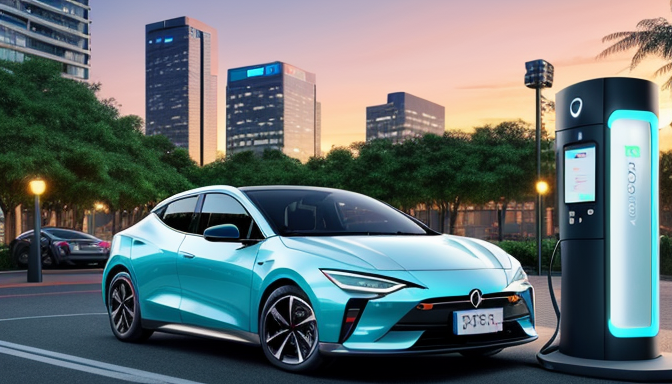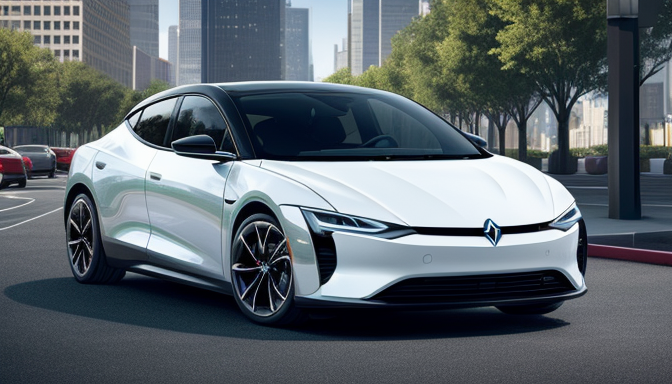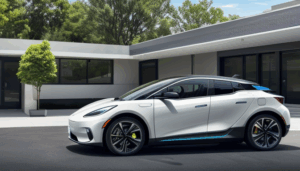When it comes to saving money, electric cars are a game changer! Imagine driving a vehicle that not only helps the planet but also keeps your wallet happy. With electric vehicles (EVs), you can enjoy lower fuel costs, which is a major perk. Charging at home is often cheaper than filling up at the gas station, and with the rise of public charging stations, you can keep those expenses down even further. Have you ever thought about how much you spend on gas each month? Switching to an electric car could be like finding a hidden treasure!
But wait, there’s more! Many governments are rolling out tax incentives and rebates for EV buyers. This means you might get a nice chunk of change back when you purchase your electric ride. It’s like a cherry on top of your savings sundae! Plus, with fewer moving parts, electric cars usually require saving you money on repairs and upkeep. Think of it as having a car that’s not just eco-friendly, but also budget-friendly!
And let’s not forget about insurance savings. Insurance rates for electric vehicles can be lower due to their advanced safety features and lower theft rates. So, choosing an electric car not only saves you money at the pump but also when it comes to your insurance premiums. In the long run, this choice can lead to significant savings. So, are you ready to make the switch and watch your savings grow?
Lower Fuel Costs
When it comes to fuel costs, electric cars are a game changer! Imagine filling up your tank for the equivalent of just a few dollars at home, rather than spending a small fortune at the gas station. Charging your electric vehicle (EV) at home can significantly reduce your monthly fuel expenses. For instance, the average cost to charge an EV is around $0.13 per kWh, compared to the national average of about $3.50 per gallon for gasoline. This difference can lead to substantial savings over time.
Additionally, utilizing public charging stations can further enhance these savings. Many cities offer free charging in public areas, and some businesses provide charging as a perk for customers. Imagine grabbing a coffee while your car charges for free! It’s not just convenient; it’s a smart financial move.
To give you a clearer picture, here’s a simple comparison:
| Vehicle Type | Cost per Mile |
|---|---|
| Gasoline Car | $0.12 – $0.15 |
| Electric Car | $0.03 – $0.05 |
As you can see, the savings are hard to ignore! With lower energy costs and the potential for free charging, switching to an electric vehicle can make a huge difference in your wallet. So why not take the leap and start saving today?

Tax Incentives and Rebates
When it comes to buying an electric vehicle, one of the most enticing aspects is the array of available. These financial perks can significantly lower the overall cost of your new ride, making it an attractive option for many consumers. For instance, in the United States, federal tax credits can reach up to $7,500, depending on the model. This means that your dream electric car could be more affordable than you think!
Many states also offer additional incentives, such as rebates or tax reductions, which can further sweeten the deal. Here’s a quick breakdown of how these incentives work:
| Incentive Type | Description |
|---|---|
| Federal Tax Credit | Up to $7,500 depending on the vehicle’s battery capacity. |
| State Rebates | Varies by state; some offer cash rebates for purchasing EVs. |
| Utility Incentives | Discounts on charging costs or rebates for home charging stations. |
To maximize these savings, it’s important to research the specific incentives available in your area. Many websites provide comprehensive lists of current offers, making it easier than ever to take advantage of these savings. So, why not dive in and see how much you can save? With the right information, driving an electric car could not only be a smart choice for the environment but also for your wallet!
Reduced Maintenance Expenses
One of the most appealing aspects of owning an electric vehicle (EV) is the significant reduction in maintenance expenses. Unlike traditional gasoline cars, electric vehicles have fewer moving parts, which means there’s less that can go wrong. Think about it: no oil changes, fewer brake replacements, and a cooling system that doesn’t require constant attention. This not only saves you time but also money!
To put it into perspective, let’s consider some key factors:
- No Engine Maintenance: Electric cars don’t have complex engines that require regular servicing.
- Braking System Longevity: Regenerative braking systems reduce wear on brake pads, extending their lifespan.
- Less Fluid Replacement: EVs don’t need transmission fluid, fuel filters, or spark plugs.
Over time, these savings can add up significantly. On average, EV owners can expect to save up to 40% on maintenance costs compared to their gasoline counterparts. So, when you think about the long-term financial benefits, choosing an electric vehicle is not just a smart environmental choice; it’s a savvy financial decision as well!

Insurance Savings
When it comes to , electric vehicles (EVs) often shine brighter than their gasoline-powered counterparts. Why? Well, it’s all about the advanced safety features that many electric cars come equipped with. These features not only enhance your driving experience but also make you less of a risk in the eyes of insurers. Think of it this way: driving an EV is like having a personal safety net that cushions you from potential accidents.
Additionally, electric cars typically have a lower theft rate. This means that insurance companies see them as less of a target, which can translate into lower premiums for you. Imagine saving money just for choosing a car that’s not only good for the planet but also keeps your wallet happy!
To give you a clearer picture, here’s a quick comparison of insurance rates:
| Vehicle Type | Average Annual Premium |
|---|---|
| Electric Vehicle | $1,200 |
| Gasoline Vehicle | $1,500 |
As you can see, opting for an electric car could save you around $300 annually on insurance alone! So, when considering your next vehicle, remember that the long-term savings go beyond just fuel and maintenance; your insurance costs can be significantly lower too!
Resale Value Considerations
When it comes to resale value, electric cars are making waves in the automotive market. You might be wondering, “Do electric vehicles hold their value better than traditional cars?” The answer is a resounding yes! Many electric vehicles (EVs) are designed with cutting-edge technology and sustainability in mind, making them more appealing to a growing number of eco-conscious buyers.
According to recent studies, electric cars often retain their value due to several factors:
- High Demand: As more people embrace green technology, the demand for used electric vehicles is on the rise.
- Tax Incentives: Buyers are often attracted to the benefits of lower running costs and potential tax credits, which can make EVs more desirable.
- Brand Reputation: Brands like Tesla have established a strong reputation for quality and innovation, which can bolster resale values.
In fact, a report from the Automotive Leasing Guide indicates that certain electric models can retain up to 60% of their original value after three years. This is significantly higher than many gasoline vehicles, which often depreciate faster. So, if you’re considering an electric car, not only are you saving money on fuel and maintenance, but you’re also making a smart investment for the future.
Frequently Asked Questions
- How much can I save on fuel with an electric car?Switching to an electric vehicle can save you a bundle on fuel costs! Depending on your local electricity rates, you could pay up to 50% less compared to gasoline prices. Plus, charging at home is super convenient!
- Are there tax incentives for buying electric cars?Absolutely! Many governments offer tax credits and rebates for electric vehicle purchases. These incentives can significantly lower the upfront cost, making it a smarter financial choice!
- Do electric cars require more maintenance than traditional cars?Nope! In fact, electric vehicles usually have fewer moving parts and require less maintenance overall. This means you save money on repairs and upkeep over time!
- Can I expect lower insurance rates with an electric vehicle?Yes! Many electric cars come with advanced safety features that can lead to lower insurance premiums. Plus, their lower theft rates make them even more appealing to insurers!
- What about the resale value of electric cars?Electric vehicles tend to hold their value well compared to traditional cars. As the market for EVs grows, you might find that they have a better resale value in the long run!

